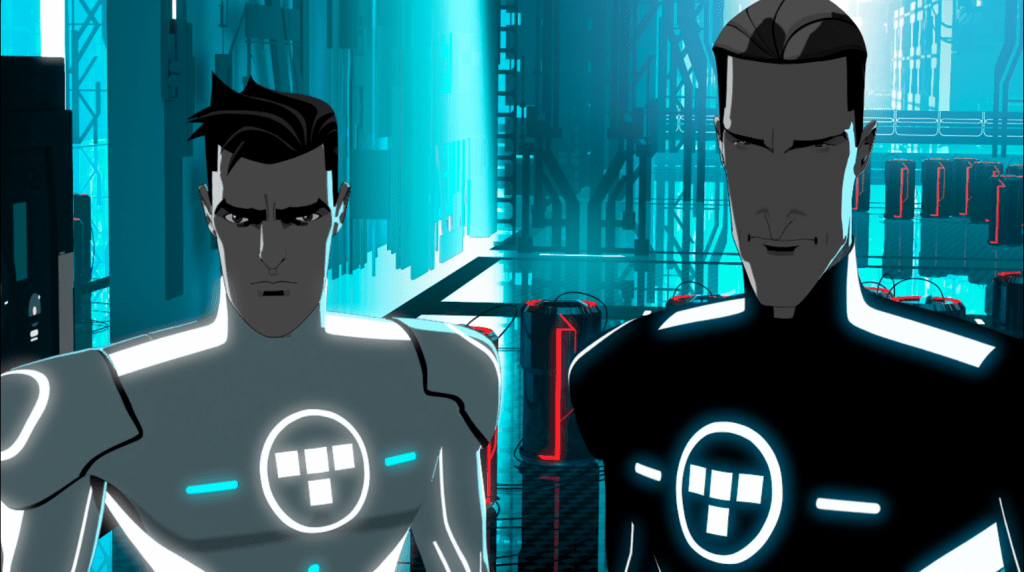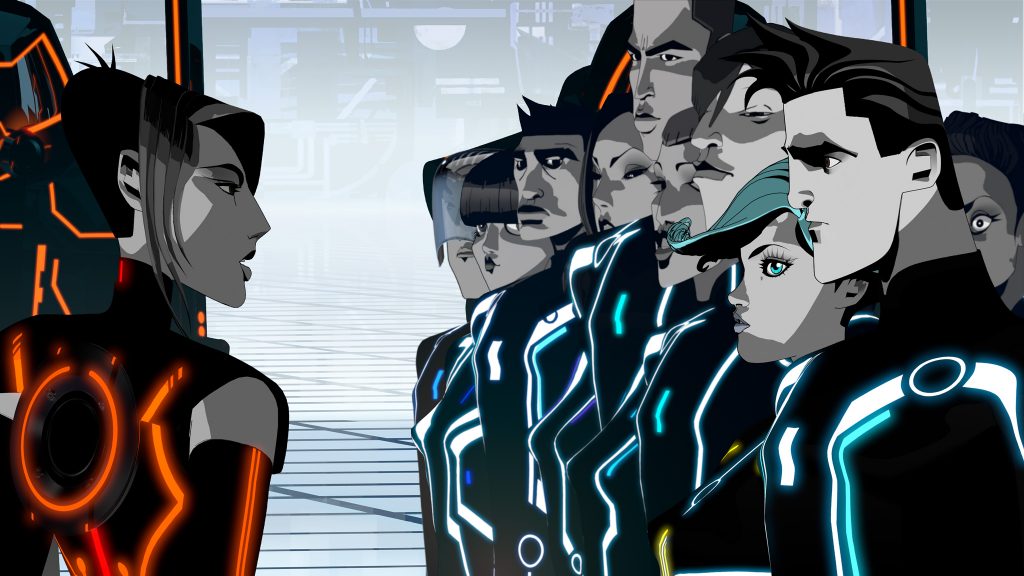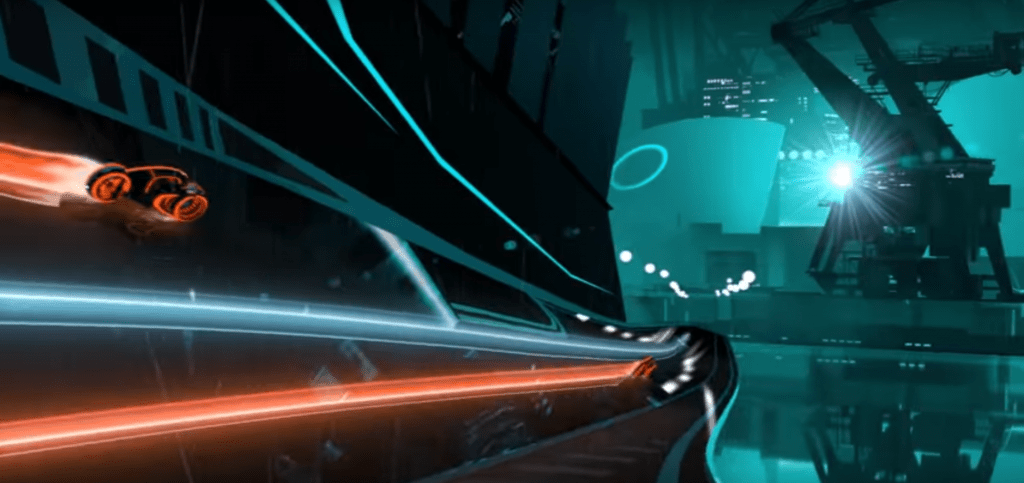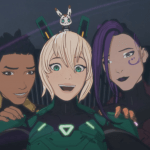“Tron: Uprising”: A Cyberpunk Drama That Is Out of This World

What if a program, in a virtual world, could start a revolution against their overlords? Tron: Uprising tries to answer that exact question. This series follows Beck, a program trained by a legendary warrior to take down the military dictator and his oppressive forces by any means necessary.
Tron: Uprising is developed by Edward Kitsis and Adam Horowitz and is based on the 1982 film, Tron, and its 2010 counterpart, Tron: Legacy. It is related to other parts of the Tron franchise, such as the video game Tron: Evolution and the comic book series Tron: Betrayal. It is the only TV series that is part of the franchise, as a live-action series had been in development but was later cancelled. This 19-episode series had Charlie Bean as the showrunner and Robert Valley as the co-director. Although I wasn’t sure what to think about this series at first, its combination of action, sci-fi, cyberpunk, drama, and superhero elements drew me in like no other show.
As a warning, this recommendation discusses some spoilers for Tron: Uprising.

Tron: Uprising centers around Beck (voiced by Elijah Wood), a young program in a computer world known as the Grid. He becomes the leader of a revolution against Clu (voiced by Fred Tatasciore), a dictator who rules over the Grid with an iron fist. As the story goes, Clu turned against the Grid’s creator, Kevin Flynn, and the Grid’s original protector, Tron (voiced by Bruce Boxleitner). Tron was reportedly killed by Clu, but somehow survived and vowed to train Beck, believing he could be the next person to defend the Grid.
Clu’s loyal enforcer is the brutal General Tesler (voiced by Lance Henriksen). He is assisted by his field commander, Paige (voiced by Emmanuelle Chriqui), and Tesler’s sadistic lieutenant, Pavel (voiced by Paul Reubens). Beck works at a garage and repair shop in Argon City run by Able alongside his friends Mara (voiced by Mandy Moore), Zed (voiced by Nate Corddry), and Link (voiced by David Arquette).
The series also features characters such as Bartik (voiced by Donald Faison) and Hopper (voiced by Paul Scheer) who are part of Paige’s task force which is trying to find Beck, known as “Renegade” or “Tron” by the public. In addition, there’s a criminal gang member named Perl (voiced by Kate Mara), a scientific program named Keller (voiced by Marcia Gay Harden) employed to brainwash those in Argon City into obeying the dictates of Clu, and a technician named Gorn (voiced by Kathryn Hunter) who specializes in modifying and erasing memories.
In some ways, Tron: Uprising begins on a similar note to Star Wars Resistance, as the protagonist of that series, Kazuda “Kaz” Xiono, works as a mechanic on the refueling station known as the Colossus, along with other mechanics. While the two series are nothing like each other, having different tone, themes, characters, and stories, there is some more overlap in terms of the voice talent. Wood and Faison voiced characters in the aforementioned series while Tatasciore and Reubens had roles in other Star Wars series.
Tron: Uprising has some diversity in its cast, as Chriqui is of Moroccan-Jewish descent, while VelJohnson, Faison, and Reddick are Black men. Although the show’s cast is mostly composed of White people, Parminder Kaur Nagra, who is of Indian descent, guest stars in one episode, as does Jamie Hector, a Black man, in another episode. Even so, the series shines in other areas.
For one, the voice actors are well-established and carry the story, and characters. Apart from those who had roles in the Star Wars series, I was aware of Moore from Tangled: The Series, VelJohnson from 3Below, Scheer from Star Trek: Lower Decks, Mara from House of Cards, and Wilde from her many films. I was not familiar with the other voice actors before watching this series, so they were new to me. The voice of Boxleitner, especially, was very defined and I think one of the best voice acting performances of the whole series.
The music of Tron: Uprising is composed by Joseph Trapanese. It is fitting for a series that often deals with dark themes, even if it is said to be for “children.” This includes characters being stabbed and disintegrating into nothing. In my opinion, this series is clearly not for children, even though it is within Wikipedia categories for children’s animated series and was rated TV-Y7 when it aired on Disney XD. It is a mature series.
This reminds me of how Samurai Jack was given the TV-Y7 rating, with a subheading for fantasy violence, meaning it should be suitable for those over age seven. This is despite the fact that in the third episode, “Part III: The First Fight,” the protagonist, Jack, is covered in black ink from the robots, which looks like blood.
The animation style of Tron: Uprising is one of the strong suits. Some described the series as a mix of 2-D animation and CGI. Variety described the series as borrowing from anime style. Showrunner Charlie Bean later said that he wanted to create a “distinct style” which hadn’t been seen anywhere else, and this series fulfills that idea.
Animation of characters and settings is very fluid, blending together in a powerful way, especially in action sequences, like the one in the episode “Blackout.” Even some of the scenes where light jets are chasing Beck, in his persona, make me think of the innumerable space battles in Star Wars Rebels. Animation of the bikes and the character designs were one of the most amazing parts of the show. The series looks and feels like something I haven’t seen anywhere else before, with its impressive chase and fight scenes and amazing background art.
This makes it no surprise that the series was nominated for Annie Awards in animated production and storyboarding for specific episodes, while it won Annie Awards for character and production design. The show’s art director Alberto Mieglo even won an Emmy Award for art direction in animation due to this series. The animation draws you in from the first episode and makes you want to keep watching. The show’s art work was one of the many reasons it was positively received.
[youtube https://www.youtube.com/watch?v=7W7V8BLScng?list=PLg6R6yXKSLYCvqzWk26c1xu52LVhPFDdD]
The story of Tron: Uprising is simple. It falls into the good/evil dichotomy, with Beck and Tron shown as “good” while Clu, Tesler, Paige, and Pavel as portrayed as “evil.” Beck is pushed to act and refuses at first, and is guided forward by Tron, a magical helper/guide, part of the first three stages of the “hero’s journey.” However, Beck does not go on a trek of any kind. Instead, the series begins a little like the first episode of Samurai Jack where Jack learns to become a warrior.
Boxleitner described the series as akin to The Mask of Zorro where he is “looking for a young one to train and…[they] have that master-student relationship.” Beck goes through training, which is, at times, brutal. He even saves one of his enemies, Paige, from being obliterated in one episode, and from being sucked into a sinking island in another.
On the other hand, he is drawn to devices that give him more power, like a special disk which he acquires in the episode “Price of Power,” which makes him more aggressive. He tries to keep it in order to save his friends, even though Tron tells him that it is dangerous. This focus reminds me a bit of Steven in Steven Universe or Elena on Elena of Avalor whose powers are tied to their emotions.
His boss at the garage, Able (voiced by Reginald VelJohnson) is akin to Yeager in Star Wars Resistance, as he discovers Beck’s life as the figure of resistance after thinking Beck is a slacker at first. He doesn’t directly support Beck but covers for him when Beck is absent from work. Later he ends up being killed by Cyrus, when a bomb gets reactivated and explodes.
Cyrus (voiced by Aaron Paul) was chosen by Tron as the first renegade and later described as his “mistake.” He believes that the only way to save everyone is to destroy the grid, that there is no free will, and that everything is pre-determined. He uses Beck in an attempt to activate an EMP but fails in this endeavor.
The character of Cyrus symbolizes the antithesis of Beck, in that he is willing to engage in violence and destruction to achieve his goals. These actions are not targeted, but are rather meant to send a message. Although Tron later kills him, he becomes weaker and is on the edge of death. Luckily, Tron is healed in the final episode and barely escapes from being reprogrammed for evil.
Yeager in Star Wars Resistance covers for Kaz, but never meets his demise. Similarly, Kanan Jarrus in Star Wars Rebels takes on Ezra Bridger as his apprentice to be trained as a Jedi. For Beck, it is different. He has a double life, struggling to balance being a freedom fighter and a mechanic at a shop. Although Able, just like Yeager, soon knows of Beck’s secret identity, he also has a history with Tron, his old friend. He first tries to convince Tron to not involve Beck, but then helps out more directly.
Tron: Uprising includes the usual themes of romantic tension. Specifically, Zed is romantically attracted to Mara and becomes jealous of how she strongly supports Beck in his Renegade/Tron persona. This is made worse by Beck, in this persona, taking advantage of Zed, time and again, annoying him even more.
Mara also has a crush on the Renegade, something which Beck is unsure of how to handle. Even so, he still helps Mara, along with Zed, to free her and other programs from mind control. In a few episodes, Beck and Paige flirt with one another and go on several dates, even though they are on different sides of the conflict. This is short-lived. It comes to an abrupt end with Pavel’s scheme to get back at her. She later claims that she got “soft” and lost focus, so she can no longer be with him. It is an open question as to how much Beck liked Paige, as he may have seen her as more of an asset and possible revolutionary than a girlfriend.
On the other hand, Mara openly supports “Tron,” even questioning official reports and declarations which describe him as a “terrorist.” She fully embodies the idea that one man’s terrorist is another man’s freedom fighter, something has been said in different forms since the 1950s. Zed is also attracted to Perl, a program he meets at a bar, until she steals a classic cycle bike.
Throughout the series, Mara comes more into her own, first when she is the temporary leader of the garage, and then as the leader of a group of graffiti artists, including herself, Moog and Rasket, known as the Jolly Tricksters. Toward the end of the series, she leads those defending Tron after she realizes that the Renegade cannot be blamed for the death of Able.
Tron: Uprising clearly indicates to the viewers which groups should be seen positively and which ones negatively. The occupation of Argon city is shown as a brutal takeover. It is akin to the Galactic Empire in Star Wars Rebels dispossessing people from their homes and enslaving others or the First Order in Star Wars Resistance which destroys entire planetary systems in shows of force. There is a curfew in one episode with a message blaring it is for the “protection” of everyone, when it is only a way to control people.
The oppression of Clu and his minions is a menace that Beck and Tron are wholly dedicated to resisting, without question. This is noted by Tricia Helfer, the voice of the Grid at the beginning of each episode. Tesler is shown using his words and messaging to try and turn the people of Argon against the Renegade without using any of his loyal lieutenants while declaring that he rules the state.
This is evident in the episode “The Reward,” where he offers anyone who gives him information a special reward, almost like a game show. It causes many people to be falsely accused of being the Renegade. At one point, Dyson (voiced by John Glover), a villain who appears in a few episodes, rightly comments about how badly Tesler and his lieutenants are ruling the city, but no one wants to listen to him.
Tesler is willing to use brutal force against anyone. He de-rezzes those who disagree with him, equivalent to killing them, with his bare hands. He often uses propaganda in an attempt to make fellow programs support his brutality and turn on the Renegade. He is no mere villain. Rather he is cunning and deceitful, with messages that people may latch onto, believing he is speaking on their behalf when he is really out for himself. Even so, he can be manipulated by faulty information.
People’s hatred of the “other” is shown in Tron: Uprising. This is most acute in Tron’s flashbacks to when he attempted to stop a peaceful demonstration against ISOs (Isomorphic Algorithms), standing between demonstrators and the ISOs. Sadly, a provocateur ends up throwing a disk and the crowd rushes the ISOs, killing them one by one, while Tron and his team are left overwhelmed.
Later, Flynn states that ISOs have just as much a right to be there as anyone. This is similar to those saying that immigrants belong in a where they set down their roots, no matter if it is their “home” country or not, as opposed to faulty arguments about undocumented immigrants.
[youtube https://www.youtube.com/watch?v=uvED2wFz1BU?list=PLg6R6yXKSLYCvqzWk26c1xu52LVhPFDdD]
One character in Tron: Uprising shows the allure of power and manipulation: Cutler (voiced by Lance Reddick). Originally an ally of the Renegade and Beck, he returns in the final episode. He has been repurposed and demands Tron’s surrender. He wants perfection and the victory of Clu. Sadly, despite Beck’s attempt to save him, it is clear that he is too far gone, so Beck lets him fall to his death.
Just like Arcane, which is part of the larger League of Legends franchise, watching the films and video games, or reading the comics of the franchise itself is not needed before watching Tron: Uprising. In fact, I had never watched anything related to the franchise, apart from a 2011 Futurama episode which has a light cycle chase scene referencing the 1982 film and its 2010 sequel.
Sadly, like all too many animated series, there are no LGBTQ characters in Tron: Uprising. The closest we have is when Keller holds a device against her neck and it changes her form into a man, so as to disguise her real identity. However, this doesn’t prevent fans from making their own headcanons of specific characters and shipping them if they see fit.
There are possible ships one could make, like between Paige and Beck in his “Tron” persona, since Paige is drawn to that persona, even willing to stop fighting it for short periods of time. However, someone could easily ship Paige with one of her female friends, or those shown in the episode “Isolated,” like Quorra (voiced by Olivia Wilde).
Currently, there are over 280 fanfics for Tron: Uprising on AO3, often with themes of angst, friendship, fluff, hurt, or comfort. Some of the popular ships on the site are Beck and Tron, as friends, along with Beck/Paige, Tron/Yori, Mara/Zed, Pavel/Zed, Sam Flynn/Quorra, and Beck/Cutler romantically. Of these, the latter appears to be the only popular ship between male characters. Some have also written fics portraying Paige as asexual, and a few writers have shipped her with Quorra, and Radia from Tron: Betrayal and Tron: Evolution, but many more have shipped her with male characters, like Tesler, Pavel, and Beck, instead.
Tron: Uprising has a certain magnetism to it, from its voice actors, the music, animation, and overall feel. It is something you want to keep watching so that you can learn the whole story.
Beck has many near-death experiences and seeing people be de-rezzed in front of him means he is experiencing some level of trauma. The events of the series weigh heavily on his friends and even on Page, especially after Pavel conspires to label her as a “traitor” with manufactured evidence even as she remains a loyal footsoldier and enforcer of Clu.
The latter scheme hints at how easy it is to spin information to take out those you don’t like, especially in an autocratic force like those occupying the grid, and that anyone can be a target. It is a very chilling idea and it has relevance to our current technological world.

To be perfectly honest, one of the original draws of Tron: Uprising was that it reminded me of a game I once played as a camp counselor with campers at a technology camp: Armagetron Advanced or “Tron” for short. It is a multiplayer computer game that tries to, according to the game’s official website, “emulate and expand on the light cycle sequence from the movie Tron,” and is said to be an arcade game of sorts “slung into the 21st century.” That is part of the reason I liked this series so much, as there are a lot of scenes with light cycles.
When watching this series, I kept thinking back to all the fun times I had when I played the game, especially when I cackled when cutting off other players and causing their light cycles to crash into my trails, leading them to explode. Those memories were part of the drive that pushed me to continue the series. So, you could say, that for me, this series was a bit of a throwback. I don’t mean that in a negative way, but rather that I like to make personal connections with what I’m watching.
The likelihood of Tron: Uprising of having another season is nil. It is less likely than a possible new season of Sym-Bionic Titan that Gennedy Tartokovsky has floated in the past. This is unfortunate because the show has the potential to be a longer series featuring many parts and chapters, just as series like Disenchantment has done. Even so, some fans have circulated a petition calling for Tron: Uprising to continue.
If there was a second season, they could expand upon the uprising in Argon City, the seizure of Able’s garage by Pavel, and the huge fleet led by Clu on its way to Argon, obviously in an effort to crush any resistance. Perhaps there could even be a plotline where Pavel’s involvement in framing Paige results in him being de-rezzed.
Tron: Uprising had a rocky airing schedule. It was effectively cancelled by Disney, which never renewed it for a second season, even after Kitsis said that the series needed more viewers. Just like Sym-Bionic Titan, the series was briefly on Netflix from 2013 to 2014, and only recently, in 2019, appeared on Disney+. When the series aired, on Disney XD, from May 18, 2012, to January 28, 2013, it received generally positive reviews.
The series might have felt a little familiar to me because Bill Wolkoff, a writer for many episodes, was most recently a showrunner for Rad Sechrist’s Kipo and the Age of Wonderbeasts. He also wrote a few Star Wars Rebels episodes. Additionally, André Bormanis, who wrote a few episodes of Tron: Uprising, is well-known for working on Star Trek series, even serving as a science consultant for various shows, so that undoubtedly rubbed off, in some way or another, into this series.
Some of the scenes in Tron: Uprising echo those in other shows, like General Hux addressing stormtroopers as they destroy planets in Star Wars Resistance, complete with slogans like “perfection is freedom.” In an attempt to discredit Beck in his Renegade persona, they even use one of his own friends, Zed, against him.
This tactic is not successful as Mara convinces him that it is wrong. Unlike the aforementioned series, there is a continual power struggle between Paige and Pavel, who are trying to impress Tesler with their plans to take down the Renegade. Pavel, in one episode, even creates a program to falsely accuse someone of being the Renegade in order to cement his power.
Paige is a fascinating and complex character, whose backstory we see most directly in the episode “Isolated.” We learn how she joined the forces of Tesler after previously being a musician and medic, feeling that the ISOs somehow “betrayed” her. The horrifying reality is that Tesler set the whole thing up so that she would think this way and join him.
She continually struggles to impress Tesler and cement her place, tracking down the Renegade whenever she can, with whatever forces are at her disposal, even forming a task force. She is so dedicated to Tesler that she rejects a plea by Pavel to form a secret alliance against Tesler. Almost like how the Colossus barely escapes the First Order time and again in Star Wars Resistance, the Renegade manages to escape repeatedly, even when putting himself into harm’s way.
It is interesting how Beck takes charge to such an extent that Tron listens to him. It becomes a case of the “master” listening to the “apprentice,” rather than the other way around. In fact, Tron is only being held together by a healing chamber and he is easing Beck into the role of being a hero.
With Tron: Uprising currently at the end of its series order, now is the time to watch it on Disney+, Amazon Prime, or elsewhere. It’s a great choice to binge over a weekend or a week!
Author: Burkely Hermann
Burkely is an indexer of declassified documents by day and a fan fic writer by night. He recently earned a MLIS with a concentration in Digital Curation from the University of Maryland. He currently voraciously watches animated series and reads too many webcomics to count on Webtoon. He loves swimming, hiking, and searching his family roots in his spare time.
Help support independent journalism. Subscribe to our Patreon.
Copyright © The Geekiary
Do not copy our content in whole to other websites. If you are reading this anywhere besides TheGeekiary.com, it has been stolen.Read our






